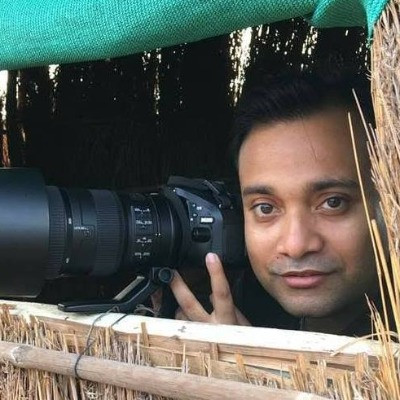Purbasthali
Situated on the banks of River Bhagirathi-Hooghly in South Bengal, the oxbow lake is a wintering site for a vast array of migratory avifauna
Tapash Roy | Moon Jana Roy
Popularly known as the Purbasthali Bird Sanctuary, this natural lake is a haven for both resident and migratory birds. Red-crested Pochard (Netta rufina).
Purbasthali
A riverine oxbow lake known as 'Chupi Char' and a cluster of islands comprise the Purbasthali Gangetic isle complex located on the meandering course of River Bhagirathi-Hooghly (a distributary of the River Ganges), in the East Bardhaman district of West Bengal.
Popularly known as the Purbasthali Bird Sanctuary, this natural lake spreads over almost 3.5sq.km. and the channel of water extends in a closed loop for almost 10km. The lake is fed fresh river water through a narrow opening. Two progressive villages – Kasthashali and Chupi are situated beside the lake.
Every year, with the onset of winter, the wetlands of Purbasthali are aflutter with the calls of migratory birds. Visitors can take a boat ride on the crystal clear water of the lake and enjoy a magical mosaic of more than 100 species of resident and migratory birds.
Apart from being a haven for migratory birds, Purbasthali is also steeped in history and religion. Temples and ruins are scattered all across the region.
Plan Your Trip
Getting There
Air
Netaji Subhash Chandra Bose International Airport in Kolkata is the nearest airport (130 to 140km away from Purbasthali).
Rail
The best way to reach Purbasthali is to board the Howrah Katwa Local, either from Howrah or Sealdah railway stations. It will take you around 4 hours to reach Purbasthali. From the station area, visitors can hire a Toto (battery-operated rickshaw) to reach the lake. The journey will not take more than 15 to 20 minutes.
Road
Visitors who love long drives can take the road. The distance between Kolkata and Purbasthali is around 130 to 140km and it will take you 5 to 6 hours to reach Purbasthali.
Best Time To Visit
Winter (December to March):
Purbasthali remains open throughout the year. But the major attractions here are the migratory birds that visit during winter season, making it the best time to visit.
Every year, starting from mid-November, migratory birds from Central Asia, Russia, Europe, and other distant countries arrive at Purbasthali after flying thousands of kilometres through the Central Asian Flyway (CAF).
During winter months, the average minimum temperature is between 10°C to 15°C, and the average maximum temperature stays between 25°C to 30°C.
History
It was a winter morning in 1988 when a group of nature lovers from an NGO called The Junglees came across an oxbow lake, and they were surprised to find a large variety of migratory birds that had made their journey from far-off lands like Central Asia, Russia, etc.
However, at the time, there was no community awareness and the lake was a hunter's paradise. Heavy hunting and habitat destruction led to decreased bird populations and pushed the entire ecosystem towards grave danger.
That is when members of The Junglees came forward, and started conducting mass awareness campaigns to educate the local villagers about the importance of the conservation of wetland ecosystems. They explained how it would help to improve the socio-economic status of the local villagers, through the development of sustainable tourism. Later on, a local body called Kashthashali Banobithi was formed by the villagers and they have been working relentlessly to preserve the biodiversity of the lake area and make the place popular with bird watchers and tourists. Today, Purbasthali is one of the most famous bird-watching sites and tourist destinations in West Bengal.
Stay
If you are traveling from Kolkata, plan for an overnight stay so that you can spend two full days exploring the place.
The best place to stay beside the Purbasthali oxbow lake is Chupi Kasthashali Pakhiralay (Pakhiralay means birds’ nest). The property was set up as a joint venture by the Purbasthali II Block Development Office (BDO), Kasthashali Gram Panchayat, and a few local clubs. This tourist centre is completely managed by local villagers. It has four newly-built lakeside cottages, one eight-bed dormitory, a landscaped park and a birdwatching tower.
Tariff for an A/C cottage (max. three occupants) will range between ₹1300 to ₹2600 per head per day and it includes breakfast, lunch, and dinner.
For booking please call: 9073565723.
Gallery
+ Add Bricks
See | Do
- The crystal clear water of the oxbow lake and surrounding farmlands attract thousands of migratory birds during winter. Among them the most popular being the gorgeous Red-crested Pochard, Osprey, near-threatened Ferruginous Duck, Common Pochard, Cotton Pygmy-Goose, Garganey, etc.
- Other species of migratory birds commonly seen here are the Lesser Whistling-Duck, Ruddy Shelduck, Tufted Duck, Common Teal, Eurasian Wigeon, Mallard, Great Cormorant, River Lapwing, Grey-headed Lapwing, Little-ringed Plover, Northern Shoveler, Northern Pintail, Siberian Stonechat, Common Greenshank, Wood Sandpiper, Eurasian Marsh-Harrier, and many more.
- The best way to enjoy avian company is to take a boat ride on the lake. The boat safari starts at 6:30AM and continues till 3PM. In winter, twilight falls early; after 3PM the light becomes inadequate for bird photography. Local row boats are used for bird watching and have space for three to four passengers in addition to the boat man. Sanjay (Mobile No: 9564642694) is the most experienced guide and naturalist in Purbasthali. Apart from an unparalleled talent for bird spotting, he will also help you discover the many subtle details about the oxbow lake.
- Fishing is another tourist attraction in Purbasthali. The oxbow lake has dense underwater vegetation which supports a wide variety of aquatic life. Though net fishing is prohibited in the lake, tourists can enjoy angling or rod fishing.
Around Purbasthali
- Nabadwip is a heritage town in the Nadia district of West Bengal. An important pilgrimage site for Vaishnavas, Nabadwip is where the great Vaishnava saint and social reformer Shri Chaitanya Mahaprabhu (1486 – 1533) was born. Nabadwip is also famous for its traditional Sanskrit tols (schools). Distance – Approx. 30km from Purbasthali.
- Mayapur is located at the confluence of River Hooghly and River Jalangi. This place is famous for Sri Mayapur Chandrodaya Mandir, ISKCON. It also houses the original residence of Swami Prabhupada, the founder-acharya of ISKCON. Distance – Approx. 20km from Purbasthali.
- Natun Gram is a village near Purbasthali famous for its wooden dolls. Tourists can witness the artists at work and can visit the folk art centre to learn more about the craft. Distance – Approx. 24km from Purbasthali.
- Samudragarh is another village near Purbasthali, where more than 1000 weavers design and weave some of the finest Tant (handloom) sarees you can find in India. Tourists can visit the weavers’ houses and buy their favourite Jamdani, Tangail and Baluchari sarees. Distance – Approx. 17km from Purbasthali.
What To Pack
- Winters can get quite cold. Be sure to pack necessary garments.
- Carry sufficient cash, as the ATMs are quite far away. Local hotels, boatmen, guides and local transport, all transactions require cash.
- Personal medicines
- Photo IDs
- Mosquito repellent
- A torch for emergencies
For Photographers
- A telephoto lens (prime or zoom) of at least 500mm focal length is essential to capture good photographs.
- Carry a wide angle lens to capture the landscape.
- A tripod will be of no use while on boat safari.
- Be sure to carry extra camera batteries and memory cards.
- Binoculars will come handy to spot distant birds.
- If required, carry a bird watching field guide. Boatmen are usually efficient enough to guide you.
Good To Know
- The lake is connected with the Hooghly River through a narrow channel. It helps to feed the lake with fresh river water and acts as a lifeline for the entire ecosystem. During monsoon, the lake gets refreshed naturally by the annual floods caused by the Hooghly River and it helps to keep the lake free from water hyacinths. Also through this channel, various freshwater fishes enter the lake for spawning, which helps sustain the livelihood of the local fishermen. At present, the channel that connects the lake to the Hooghly river has narrowed down substantially due to rapid sedimentation. Unless dredged immediately, the channel will get blocked and cut off the flow of freshwater into the lake, and Purbashthali will die a natural death.
- Now Purbasthali has become a well-known weekend destination. Every winter, the region witnesses a huge influx of tourists. While the increased tourist attraction has helped prosper the local economy, it has had its evil effects too. Apart from bird watchers, a good number of tourists visit here for picnic purposes. This mindless crowd has no respect for nature and wildlife. They litter the lake and its surroundings and blast music at high decibels, thus disturbing the lake’s avian residents.
Budget Per Person
- There is no entry fee or camera charges to visit Purbasthali.
- The cost of a boat safari is ₹150 per hour and bird watching guide charge is ₹100 per hour.
- Accommodation and food cost will be between ₹2000 to ₹3000 per day for a double occupancy room.
Friday, 02 July, 2021
We love a good critique but are infinitely partial to compliments. Both, roars and birdsong are welcome at [email protected]

Tapash Roy
Wildlife Photographer
Tapash Roy is a digital agriculture professional and has a passion for nature photography. Whenever he gets time from work, he loves to spend time in nature, and he tries to capture a few glimpses of its endless beauty through his camera.

Moon Jana Roy
Wildlife Photographer
Moon Jana Roy completed her PhD in Environment Communication from Centre for Journalism and Mass Communication, Visva Bharati University. She works as an Assistant Professor at Asutosh College, Kolkata. Moon is also a member of the Himalayan Nature and Adventure Foundation.
Story recommendations
- Thoothoor
- Muttom
- Kanyakumari
- Manapad
- Dhanushkodi
- Puducherry
- Alamparai
- Chennai
- Andaman & Nicobar
- Andhra Pradesh
- Arunachal Pradesh
- Assam
- Bihar
- Chandigarh
- Chhattisgarh
- Dadra and Nagar Haveli
- Daman and Diu
- NCT of Delhi
- Goa
- Gujarat
- Haryana
- Himachal Pradesh
- Jammu and Kashmir
- Jharkhand
- Karnataka
- Kerala
- Lakshadweep
- Madhya Pradesh
- Maharashtra
- Manipur
- Meghalaya
- Mizoram
- Nagaland
- Odisha
- Puducherry
- Punjab
- Rajasthan
- Sikkim
- Tamil Nadu
- Telangana
- Tripura
- Uttar Pradesh
- Uttarakhand
- West Bengal
